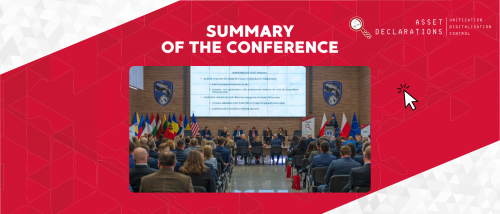...
On the occasion of the International Anti-Corruption Day, the Central Anti-Corruption Bureau, on Dece mber 9-10 this year, held a conference entitled “Assets declarations - unification, digitization, control", at the Cyber Command in Legionowo. The event was held under the honorary patronage of the Minister of the Interior and Administration, Mr. Tomasz Siemoniak; the Prime Minister and Minister of Digital Affairs, Mr. Krzysztof Gawkowski; and the Prime Minister and Minister of National Defense, Mr. Władysław Kosiniak-Kamysz.
On the first day, representatives of public administration, non-governmental organizations, and anti-corruption institutions from Poland and abroad gathered to discuss ways to establish an effective system for submitting asset declarations. A representative of the Central Anti-Corruption Bureau (CBA) presented the current legal framework for asset declarations, emphasizing the dispersed nature of regulations across numerous legal acts, their inconsistencies, and the inadequate and disproportionate penalties for submitting false information.
The presentation also addressed advanced work on a draft legal act regarding asset declarations, prepared by special services under the direction of the Minister Coordinator for Special Services, Mr. Tomasz Siemoniak. The key objectives of the draft include:
- unification of regulations,
- transparency of asset declarations,
- Digitalization of the submission system,
- introduction of a unified declaration form,
- expansion of the list of obligated persons,
- implementation of a correction mechanism for declarations,
- clarification of the scope of declarations,
- introduction of new types of penalties for false declarations.
A debate followed, involving representatives from Citizens Network Watchdog Poland, the Stefan Batory Foundation, the Institute of Public Affairs Foundation, and the Central Anti-Corruption Bureau. They discussed proposed legal solutions for the transparency of asset declarations and criminal sanctions for providing false information. The debate also touched on expanding the list of individuals required to submit declarations. The discussion generated significant interest from conference participants, who posed numerous questions about the proposed legislation.
Subsequently, guests from Romania, Estonia, Moldova, Ukraine, and Latvia presented their experiences in digitalizing asset declaration systems.
The second day of the conference focused on the critical issue of building a centralized system for submitting asset declarations to ensure transparency in public life. Cybersecurity experts highlighted challenges related to securing data in asset declarations, emphasizing the need for advanced technological solutions. The exchange of views and experiences allowed participants to better understand the complexities of data security in the context of asset declarations.
The panel of speakers included representatives from: The Cyber Command, The National Research Institute (NASK), The Central Anti-Corruption Bureau, The Internal Security Agency, The Ministry of Digital Affairs, The Statistics Poland, The Ministry of Finance.
The conference provided a valuable platform for discussing the unification, digitalisation, and effective control of asset declarations as a cornerstone for enhancing transparency in public administration and combating corruption.
